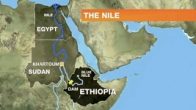BY AREGU B. WONDIMUNEH – It has done it before, and it is doing it again. When the technical and legal experts and ministers of water and foreign affairs of Egypt, Sudan and Ethiopia concluded rounds of talks without a comprehensive document to settle the issues regarding the filling and operation of the Grand Ethiopian Renaissance Dam (GERD).
It wasn’t entirely unexpected. Discussions of similar nature were held for several times in the past and the results were predictable. Egypt has always positioned itself as one who must get the better end of the deal. In the past, Egypt exhausted every means within its power to make sure its monopoly over River Nile was unchallenged and negotiations regarding utilization of the river water with the Ethiopia or other riparian countries, for that matter were off the table.
Its leaders have in effect refused to recognize Ethiopia’s right to have a fair share of the Blue Nile River to which it is not only the source but also contributor of 87 of the water. Instead of working on a mutually beneficial and win-win approach, Egypt made it a strategy for decades to either threaten Ethiopia not to utilize the River water or ally themselves with the internal and external enemies of the country to make sure that it won’t be in any position to carry out any major projects on the River.
In fact, that has been strategy all along until the launch of the Grand Renaissance Dam (GERD). Although the two countries have had long standing ties and share much more than just a river, their relationships have always been overshadowed by the water politics.
Ethiopia has for long remained hands tied and helplessly watched its largest river gushing out caring fertile soil washed away from the country’s highlands. If there existed any attempts on the Ethiopian part to build any form of development projects on the Blue Nile River, they were met with military threats from Egypt.
Egyptian leaders also had no trouble convincing financial institutions to block any form of financial aid to Ethiopia. As a result, Egypt had neither the interest nor the urge to work on any cooperation framework with Ethiopia. because Ethiopia was in no political or economic status that would allow it to carry out any major undertakings on the river water.
The launch of the Grand Renaissance Dam was not only an important milestone in the country’s effort to fill the huge power demand-supply gap. It also was a demonstration of the fact that the country is capable of undertaking projects of such nature with local resources. Egypt has been forced to come to the negotiation table because its old strategy will have no place any longer.
Egypt opposed the construction of the Dam from the very beginning. In fact, there were a couple of times the country’s newspapers reported that Egypt might use military force to stop the building of the dam. Now the Dam has reached its completion stage.
For many years now, Egypt has been enjoying its unchallenged monopoly over the utilization of River Nile. There was no agreement or treaty which Ethiopia is part of and that entitled Egypt to dictate who gets what when it comes to sharing the river water. The country relied on the its military might and geopolitical influence.
However, Ethiopia, which is the source of the Blue Nile and contributor of 87 per cent of the water was literally ripped of all its rights to get the fair share of the river water, as a result of the direct and indirect influence of Egypt.
Egypt portrays itself as the creation of River Nile. Its leaders have always wanted the world to believe that any development projects on the river by the upper riparian countries will seriously jeopardize the country’s socioeconomic activities since the Nile is the only source of water for the country. True, the Nile is the major water source for Egypt’s economy. However, it is not the only waterbody available for the country.
Egypt is surrounded by two other large water bodies, namely the Red Sea and the Mediterranean Sea. Like many of its neighbors in the Middle East and many other countries around the world Egypt has water resources that can be desalinated and utilized.
At times Egypt justifies its monopolistic right over the river with agreements that were concluded without even participating the source country. The so called agreements were concluded in 1929 and 1959 between Egypt and Sudan when both countries were British its colonies.
Because Egyptian leaders relied much on the country’s military might and political influence for much of the country’s long history they seem to be struggling to face the reality that Ethiopia, as a source of the water and contributor of the larger share of the water has the right to utilize the water. That has been reflected on the recent negotiations.
According to experts, the GERD is less of a threat for the downstream countries including Egypt, In fact studies which were conducted on possible impact of the Dam even suggested that it has a positive contribution toward regulating the water flow and protecting flood occurrences particularly in the Sudan.
If there is one problem that is worrisome to not only to the downstream countries but also to upper stream countries including Ethiopia, it is climate change and deforestation which may seriously impact the water volume of the river. Egypt, Ethiopia as well the rest Nile riparian counties should shift their focus and energy toward tackling this problem.

